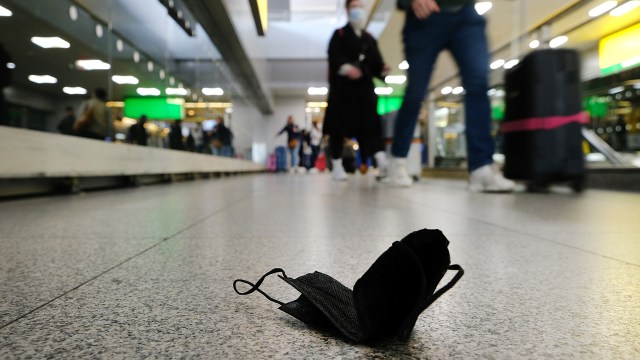
A majority of U.S. adults (57%) say travelers on airplanes and public transportation should be required to wear masks, according to a new Pew Research Center survey. A smaller share (42%) say travelers should not be required to wear masks in these situations.
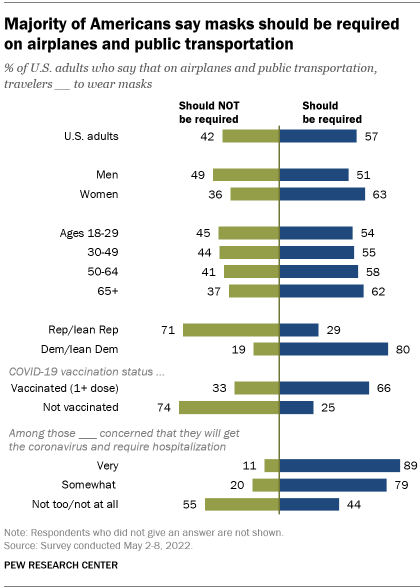
In April, a federal judge in Florida struck down the U.S. government’s mask mandate for planes and public transportation. The Department of Justice is in the process of appealing the decision, and the Centers for Disease Control and Prevention is recommending that people continue to wear masks in these settings. For now, airlines and other businesses are able to set their own rules, with most leaving mask-wearing optional.
As has often been the case on policy questions about how to deal with the coronavirus outbreak, partisans are far apart in their views on this issue. A large majority of Democrats and independents who lean to the Democratic Party (80%) say travelers on airplanes and public transportation should be required to wear masks. By contrast, 71% of Republicans and Republican leaners say travelers should not be required to wear masks.
Pew Research Center surveyed 10,282 Americans to understand their views on the COVID-19 pandemic. This survey was conducted from May 2 to 8, 2022.
Everyone who took part is a member of the Center’s American Trends Panel (ATP), an online survey panel that is recruited through national, random sampling of residential addresses. This way nearly all U.S. adults have a chance of selection. The survey is weighted to be representative of the U.S. adult population by gender, race, ethnicity, partisan affiliation, education and other categories. Read more about the ATP’s methodology.
Here are the questions used in this analysis, along with responses, and its methodology.
There are differences in views on mask requirements across a range of other characteristics, including gender, age, vaccination status and level of concern about getting COVID-19.
A majority of U.S. adults who have received at least one dose of a COVID-19 vaccine (66%) say masks should be required for travelers on airplanes and public transportation. Among those who have not received a COVID-19 vaccine, just 25% think masks should be required. Even among the unvaccinated, however, there are partisan differences in views: For instance, 60% of unvaccinated Democrats think masks should be required for travelers on airplanes and public transportation, but 12% of unvaccinated Republicans think masks should be required.
On a separate question in the new survey, Americans are now much less likely than they were during earlier stages of the outbreak to say they’ve been wearing a mask in public, as other public polls have also found.
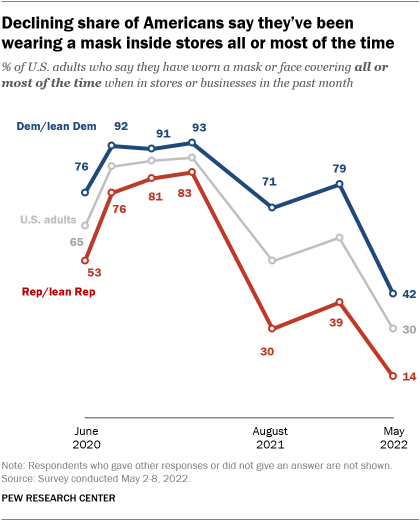
Overall, 30% say they’ve been wearing a mask inside stores and businesses all or most of the time over the past month. About a quarter (23%) say they’ve done this some of the time, and 44% say they have never or hardly ever done this.
In January, amid a surge in cases driven by the omicron variant, 61% of U.S. adults said they had been wearing a mask inside stores and businesses all or most of the time.
Democrats remain much more likely than Republicans to say they’ve been wearing a mask frequently when inside stores and businesses (42% to 14%).
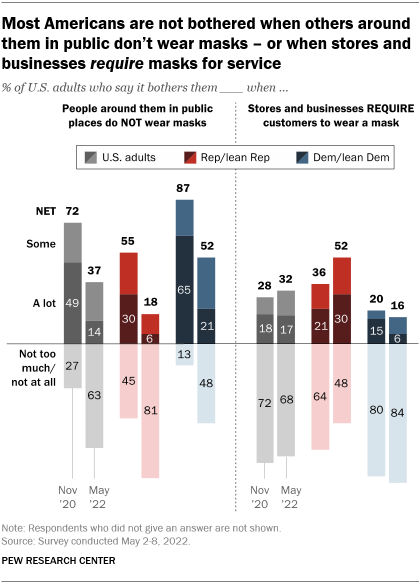
While mask-wearing among U.S. adults has become much less common in recent months, relatively small shares say they are bothered when stores or businesses require customers to wear a mask. About a third (32%) say it bothers them a lot or some when stores and businesses require a mask for service, but 68% say this bothers them not too much or not at all. The share of adults who say they are bothered by business mask requirements is up just 4 percentage points since November 2020.
Separately, there has been a sharp decline in the share of Americans who say it bothers them when people around them in public settings do not wear a mask.
Overall, 37% of adults say it bothers them a lot or some when people in public do not wear a mask around them; a much larger share (63%) say this bothers them not too much or not at all. In November 2020, before COVID-19 vaccines were widely available, 72% said it bothered them a lot or some when people around them in public did not wear a mask. As with other attitudes around masks, there are large partisan gaps on these two measures, with Democrats much more likely than Republicans to be bothered by people around them not wearing masks, and Republicans far more likely than Democrats to be bothered by stores requiring masks.
Beyond mask use for the coronavirus outbreak, a large share of Americans express openness to wearing a mask to help deal with other infectious diseases – namely, a cold or the flu, according to the new survey.
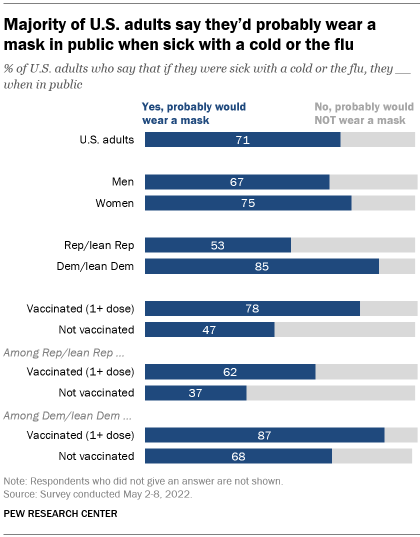
About seven-in-ten Americans (71%) say that if they were sick with a cold or the flu, they would probably wear a mask in public, while 27% say they would probably not.
Public health officials have been evaluating whether to recommend masks to help control the spread of the flu.
A large majority of Democrats say they’d probably wear a mask in public if they had a cold or the flu (85%). Republicans are much less likely to say this; still, slightly more than half (53%) say they would probably wear a mask.
Those who have received a COVID-19 vaccine are much more likely than those who have not to say they’d probably wear a mask if they had a cold or the flu (78% to 47%). This pattern by vaccination status holds among both Republicans and Democrats.
Note: Here are the questions used in this analysis, along with responses, and its methodology.



